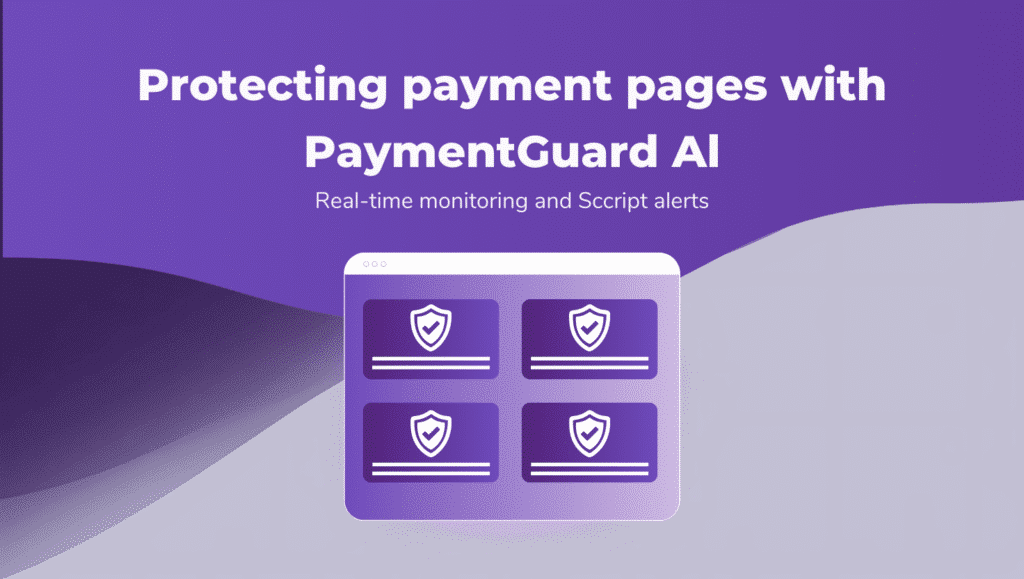
文章介绍了PCI DSS 4.0.1标准的重要性及其对使用复杂支付系统的商家的影响。SAQ A-EP适用于管理自定义支付页面和与第三方处理器合作的企业。Feroot PaymentGuard AI通过实时监控脚本和检测未经授权的变化来增强安全性和合规性。 2025-3-13 15:8:53 Author: securityboulevard.com(查看原文) 阅读量:2 收藏
Introduction
The Payment Card Industry Data Security Standard (PCI DSS) is crucial for security compliance and regulatory compliance. Merchants who accept online payments should follow it as part of their security strategy to ensure safe transactions.
This is especially true for those using the Self-Assessment Questionnaire (SAQ) A-EP. These merchants run complex e-commerce systems. They manage custom payment pages, interactive checkout flows, and work with third-party payment processors like Stripe or Square.
Cyber threats, like data breaches, script injections, and phishing attacks, are becoming more common and advanced. A strong compliance program for PCI DSS is not just a rule. An important sign of trust for customers.
Businesses like SaaS platforms, online retailers, travel booking sites, gaming companies, and digital service providers use complex payment systems. This complexity puts them at higher security risk because evolving cyber threats and sophisticated attacks. Traditional compliance methods, like manual audits or basic firewalls, often fall short in these dynamic settings.
Feroot PaymentGuard AI provides an advanced, automated solution to help with compliance and protect payment data. In this article, we will discuss SAQ A-EP.
We will break down the important requirements of PCI DSS 4.0.1. We will also show how PaymentGuard AI helps businesses stay secure. This is important for being ready for audits in a risky digital world.

Who Needs SAQ A-EP Compliance?
Understanding SAQ A-EP Fits
SAQ A-EP is part of the PCI DSS framework. This compliance framework is important for e-commerce merchants with advanced payment systems. SAQ A-EP is for businesses that use custom payment pages or interactive methods to handle cardholder data. If your business manages payments through customized or integrated processes, SAQ A-EP is likely the right choice.
Businesses Affected
Here’s a closer look at the types of businesses impacted:
- SaaS and Subscription Platforms: Companies like CRM providers and streaming services use special payment forms for recurring billing. They need strong security controls to protect credit card information and ensure compliance.
- Online Stores with Custom Checkout Pages: Retailers create unique shopping experiences, like boutique brands or niche marketplaces. They use custom code that needs strong protection.
- Travel Booking Sites: Platforms aggregating flights, hotels, and car rentals frequently juggle multiple payment gateways and interactive forms.
- Gaming Platforms: With small in-game purchases, DLC purchases, and subscriptions, gaming sites need scalable, secure payment systems.
- Digital Service Providers: From cloud hosting to online education, these businesses integrate diverse payment tools to serve global customers.
- Charities Accepting Online Donations: Nonprofits using custom donation pages must protect donor data to maintain credibility.
Why It Matters
These merchants work in complex systems. They use custom payment pages, iFrame forms, and interactive checkout flows. They also work with payment services like PayPal, Adyen, or Braintree. This helps them follow PCI DSS rules for secure payments.
This complexity introduces risks like cross-site scripting (XSS), data skimming (e.g., Magecart attacks), and unauthorized script injections. For example , a travel site might use a third-party booking tool. If not watched closely, this tool can create security gaps.
To comply with SAQ A-EP, businesses must act against these threats. They must know their responsibilities and use the right tools.
Key PCI DSS 4.0.1 Requirements
Overview of PCI DSS 4.0.1
PCI DSS version 4.0.1, presented by PCI Security Standards Council started this program in 2022. It will be fully operational by March 31, 2024. It strengthens e-commerce security and ensures that businesses comply with PCI DSS more effectively.
For SAQ A-EP merchants, two requirements are particularly critical: Requirement 6.4.3 (Script Management) and Requirement 11.6.1 (Change Detection). We will analyze them in detail to determine how PaymentGuard AI aligns.
Requirement 6.4.3: Script Management
What It Entails
This requirement focuses on securing scripts on payment pages—a growing attack vector as cybercriminals exploit legitimate code. It plays a crucial role in ensuring payment page security compliance. Malicious scripts, often injected via supply chain attacks or third-party plugins, can siphon cardholder data in real time.
How PaymentGuard Helps
PaymentGuard AI addresses this by:
- Tracking All Scripts: It creates a live list of scripts. It marks first-party and third-party sources, like analytics tools or ad trackers.
- Enforcing Content Security Policy (CSP): PaymentGuard restricts script execution to approved sources, thwarting unauthorized code.
- Using Subresource Integrity (SRI): It verifies script authenticity, ensuring no tampering occurs mid-delivery.
- Real-Time Compliance Monitoring: The platform detects anomalies—like a script suddenly exfiltrating data—and logs activities for audits.
Real-World Example
Consider an online store using a chatbot script from a third-party vendor. If someone compromises that script, PaymentGuard’s real-time oversight can block it before damage occurs.
Requirement 11.6.1: Change Detection
What It Entails
Unauthorized changes to payment pages—like a hacker adding a rogue form field—can compromise security. Requirement 11.6.1 mandates continuous monitoring to catch these issues.
How PaymentGuard Helps
PaymentGuard excels with:
- Continuous Scanning: It checks pages across all environments (production, staging, dev) for unexpected changes.
- Instant Alerts: Merchants receive notifications instantly—e.g., if someone alters a checkout page’s HTML without approval.
- Detailed Reporting: Comprehensive logs make it easy to prove compliance during audits.
Real-World Example
A gaming platform launching a new payment feature can use PaymentGuard. This helps ensure no unwanted changes occur, keeping the rollout secure and compliant.
Schedule a Demo
You will see how to easily automate PCI-DSS 4.0.1 compliance for Requirements 6.4.3 and 11.6.1 in minutes.
- Autonomously and continuously maintain inventory of scripts, assure integrity, and confirm scripts are authorized.
- Automatically detect and prevent unexpected script activities.
- Get alerted of unauthorized scripts and unexpected script activities.
- Easily provide reports to your teams and QSA.
- Keep your company protected.
How PaymentGuard Helps
A Comprehensive Solution
Feroot PaymentGuard AI is more than a compliance checkbox—it’s a strategic ally for SAQ A-EP merchants. It bridges the gap between regulatory demands and practical security through three pillars:
Automated Compliance
Streamlining Processes
Manual processes for tracking scripts or detecting changes are slow and easy to overlook. Automated compliance management with PaymentGuard makes these tasks faster and improves risk assessments.
PaymentGuard automates these tasks:
- Script Monitoring: Real-time visibility into script behavior, with automatic classification (e.g., safe, risky, malicious).
- Change Detection: Ongoing scans to identify unauthorized modifications instantly.
- Compliance Reports: Ready-to-use reports for PCI DSS v4.0 assessments, cutting audit prep time.
- Integration: Works with tools like Splunk or CrowdStrike for a unified security stack.
Strong Security Controls
Proactive Defense
PaymentGuard proactively defends PCI DSS for e-commerce environments by monitoring threats and enforcing strict security policies.
- Centralized Management: A single interface to oversee scripts and changes across multiple sites.
- Real-Time Threat Detection: AI-powered detection spots threats like skimming scripts or XSS exploits.
- Multi-Site Monitoring: Perfect for businesses with regional storefronts or multiple domains.
- Third-Party Risk Protection: It reduces risks from outside scripts. This is important because 70% of breaches involve third-party code, according to recent studies.
Ongoing Compliance Checks
Staying Ahead
Compliance is an ongoing process that requires long-term commitment. PaymentGuard ensures continuous compliance by keeping businesses ahead with:
- Automated Security Scans: Daily checks for policy violations or new risks.
- Instant Alerts: Notifications for issues like an unapproved script loading.
- Audit-Ready Logs: Detailed records to satisfy Qualified Security Assessors (QSAs).
Practical Scenario
Imagine a SaaS platform integrating a new payment gateway. PaymentGuard ensures the rollout stays secure and compliant without bogging down developers—a win for efficiency and protection.
How to Implement PaymentGuard
Step-by-Step Guide
Deploying PaymentGuard is a streamlined process designed to fit any e-commerce setup. Here’s how it works:
Step 1: Initial Assessment
Begin with a thorough review:
- Map your payment ecosystem—pages, scripts, third-party tools.
- Pinpoint gaps, like untracked scripts or lax change controls.
- Set goals, such as automating audits or reducing third-party risks.
Step 2: Deployment
Installation is fast and flexible:
- Add PaymentGuard via a lightweight JavaScript snippet or API.
- Configure policies—e.g., whitelist approved scripts, set alert triggers.
- Activate monitoring and test notifications across payment flows.
Step 3: Ongoing Security
Once running, PaymentGuard operates seamlessly:
- Track compliance via an intuitive dashboard with real-time metrics.
- Act on alerts—like blocking a suspicious script—instantly.
- Update policies as your business evolves (e.g., launching a new site).
- Export logs for quarterly reviews or annual PCI DSS Compliance audits.
Example in Action
A travel site could deploy PaymentGuard to secure a multi-vendor booking system, ensuring compliance without disrupting operations.
Best Practices for SAQ A-EP Compliance
Essential Strategies
Tools like PaymentGuard, as part of broader compliance solutions, shine when paired with solid practices:
Script Management
- Maintain a Script Inventory: List every script, its role (e.g., analytics, payment), and origin.
- Pre-Approve Scripts: Vet all code—especially third-party—via security reviews.
- Enforce Change Controls: Restrict script edits to authorized staff and log updates.
- Monitor Third Parties: Audit vendors quarterly for compliance and vulnerabilities.
Change Detection
- Continuous Monitoring: Automate page scans to catch changes in real time.
- Log Approved Changes: Keep a changelog to distinguish valid updates from threats.
- Block Unauthorized Updates: Use CSP and SRI to prevent rogue modifications.
Documentation
- Keep Detailed Logs: Track script runs, page changes, and incident responses.
- Track System Changes: Document updates to payment flows or integrations.
- Build an Incident Response Plan: Define steps for breaches—e.g., isolate, investigate, report.
These habits, combined with PaymentGuard, create a resilient security posture.
Conclusion
SAQ A-EP compliance presents significant challenges for merchants. They must protect complex payment systems from new threats. At the same time, they need to meet PCI DSS standards.
Feroot PaymentGuard AI simplifies compliance efforts with automated compliance management, real-time monitoring, and robust security controls. It tracks scripts, detects changes, and generates audit-ready reports—slashing manual effort while protecting customer data.
For SaaS platforms, retailers, charities, or any e-commerce business, PaymentGuard ensures compliance is a strength, not a burden. It adapts to new risks, streamlines audits, and cuts business costs—all while safeguarding trust. In a world where a single breach can devastate a brand, PaymentGuard is a smart investment.
如有侵权请联系:admin#unsafe.sh

